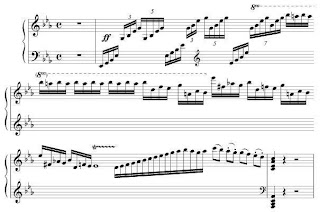( Music for high school 1). The belief that the teaching of European literature and its movement is not possible without a close relationship with the music, which practically does not exist in high school, we provide teachers and students brief profile guide to listening, character biography and history, no expertise, some symphonic and instrumental works of great composers. The Concerto 5 called "Emperor" Beethoven can be inserted into teaching units devoted to pre-transition from neoclassicism to romanticism, and of course the Napoleonic era. The execution reference is given to Maurizio Pollini with Claudio Abbado Director Plan. Live recording in Rome December 30, 1967.
GUIDE TO LISTENING. The fact that the Emperor is rightly regarded as the culmination of research in the field of Beethoven's piano concert must reflect at least two good reasons. First, because, without precedent, the teacher in Bonn was able to customize after only five scores (many are concerts piano and orchestra that he composed) a kind of the most popular and conventional instrumentalism of the European so-called "Age of Classicism." Secondly, it should be noted that the year 1809, almost two decades is the fatal 1827, date of death of the "Titan." So one wonders why he stopped so early Beethoven to dedicate ¬ Cars to composing concertos for piano and orchestra? For the progression of hearing loss, no doubt, being grown primarily a kind of category, then very well paid, the composer-performers (best composer-virtuoso), but also because, come the fifth of its scores for soloist accompanied felt probably exceeded that particular form of music to communicate with the world of listeners. Therefore seen in the way its creator probably intended it, the Emperor is the result of a poetic composition and revolutionary at the same time, the final act in a musical playing field that had been given the maximum. What has been said does not lessen, however, the immense fortune of the public met in the Fifth Concerto by Beethoven since, November 12, 1811 in Leipzig, was performed for the first time by Friedrich Schneider. Since then, and thanks to the wonderful interpretations Daten during the nineteenth century by such formidable pianists Czerny, Hiller, Döhler and von Bülow, the Emperor has never stopped dominion between the scores from the world of music lovers favorite. And this despite the fact that nobody has been able to convincingly explain the origin of the subsection which is inextricably linked to its popularity.
is true that between the sketches of the first movement of Beethoven autographs noted programmatic captions as "Song of triumph in the battle," "assault" or "victory" but it seems difficult to lead them to support the musician to Napoleon because in this time this figure had aroused, and we're in the years 1809-'10, a strong anti-French feeling in the teacher. Or is realistic to consider the anecdote according to which Beethoven after Napoleon thought to remove the name from the leaves, with anger, discovering a vocation authoritarian? It will then be true that the smart shop the same publisher as the concert dedicated to the leader to increase the charm? In any event, it is certain that even if the puzzle will remain unanswered, the public will not cease to get excited at the sound of the score that is associated with it. The fifth concerto is divided into three movements linked by extremely essential inventive about the amount of issues in play, and great eloquence elaborative, relative to the variety of their treatments.
TELLUSfoglio-School
Beethoven Concerto No 5 Emperor, starting the second half. Glenn Gould on piano
Abbado - Barenboim at the piano
http://www.youtube.com/watch?v=XQXAjZ00gCc&feature = related

0 comments:
Post a Comment